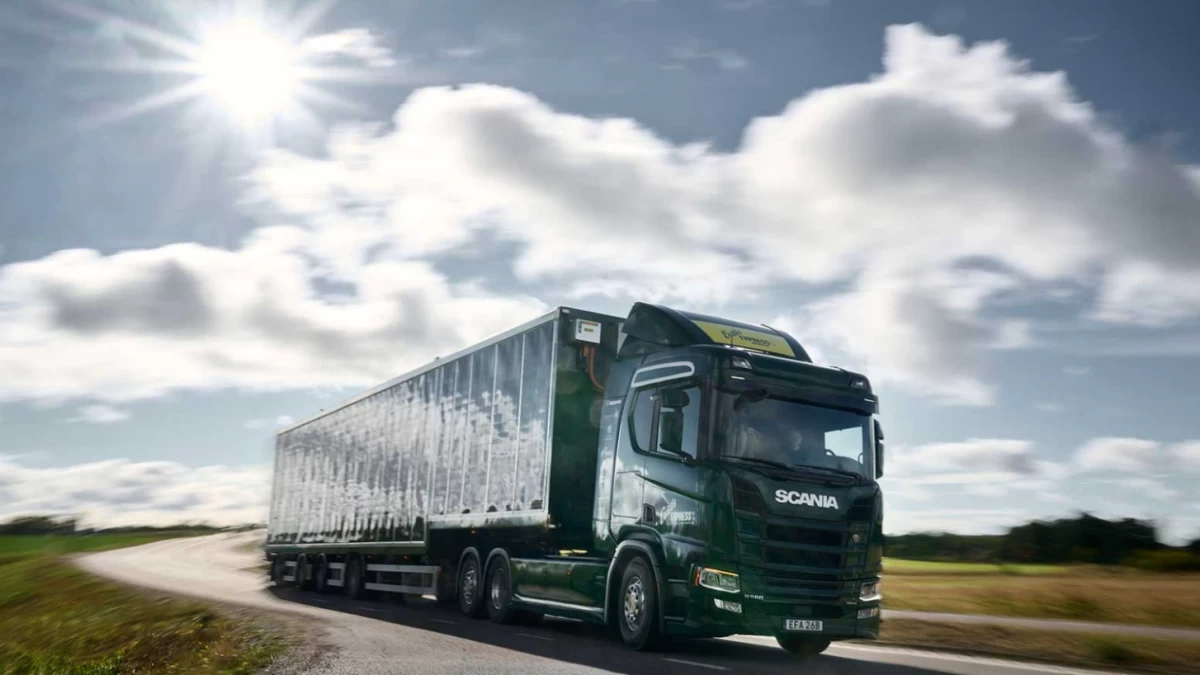Transportation contributes significantly to Europe’s carbon emissions, with heavy-duty haulage vehicles playing a substantial role. Swedish manufacturer Scania is at the forefront of finding innovative solutions to decarbonize existing trucks and reduce the environmental impact of goods transportation.A key challenge in reducing carbon emissions from haulage is the longevity of trucks, with a lifespan of 15 to 20 years.
The focus is not only on the latest trucks but also on finding solutions applicable to the existing rolling fleet. A key challenge in reducing carbon emissions from haulage is the longevity of trucks, with a lifespan of 15 to 20 years. To address this, Scania is exploring various options, and solar-powered trucks have emerged as a promising avenue. The focus is not only on the latest trucks but also on finding solutions applicable to the existing rolling fleet.
The Solar Hybrid Truck Concept: How It Works
Scania, in collaboration with Uppsala University, has developed a solar-powered trailer equipped with solar panels. Unlike standalone solar trucks, this concept involves a hybrid setup where the trailer acts as an additional battery. With the capacity to store around 200 kilowatt-hours of energy, approximately three times more than the tractor, the trailer significantly contributes to energy storage.
The innovative aspect lies in the ability of the solar-covered trailer to function as an independently powered electric vehicle. This versatility enables it to connect to both old combustion tractors and modern hybrid ones. The trailer offers dynamic charging while on the move, utilizing solar panels on the truck rather than stationary roadside installations.
Efficiency and Environmental Impact: Preliminary Insights
Initial testing of a solar trailer with a combustion engine suggests a potential reduction in fuel consumption by approximately 40%. This promising outcome underscores the viability of integrating solar technology into existing haulage systems to achieve significant efficiency gains and environmental benefits.The solar hybrid truck concept involves a trailer covered in solar panels, connected to a hybrid tractor. Acting as an additional battery, the trailer can store around 200 kilowatt-hours of energy, three times more than the tractor. Dynamic charging while driving further enhances the efficiency of the system, making it a dual-advantage solution for reducing both fuel consumption and carbon emissions.
Testing on Swedish Roads
Solar hybrid trucks, a revolutionary solution to decarbonize haulage, are currently undergoing extensive testing on Swedish roads throughout 2024. Despite Sweden’s limited sunlight, the choice of testing location aligns with the belief that if the technology proves effective in such conditions, it can thrive in sunnier regions. The ongoing tests will provide valuable insights into the trucks’ performance, efficiency, and adaptability to various environments. Overcoming challenges posed by weather conditions, including snow and reduced daylight, is a crucial aspect of ensuring the robustness and reliability of the solar-powered haulage solution.
Challenges in Solar Panel Integration
One of the pivotal challenges in the integration of solar panels on trucks lies in the procurement of appropriate panels. Unlike conventional panels designed for stationary houses, truck-mounted panels face exposure to dirt, grime, and potential damage from roadside elements. The panels must withstand the vibrations created during truck movement and incorporate safety features to prevent short circuits in case of accidents. Ensuring the durability, lightweight nature, and safety of the solar panels are crucial aspects that demand meticulous consideration for the technology to scale successfully. Overcoming these obstacles is essential for the seamless implementation of solar-powered solutions in the transport sector.
The Path to Commercialization: Future Prospects
As the solar hybrid truck concept undergoes rigorous testing, its success holds the promise of transforming the haulage industry. Commercializing this technology necessitates addressing technical challenges, adhering to safety standards, and showcasing its efficiency across diverse operational conditions. While Scania pioneers the endeavor to revolutionize haulage with solar-powered trucks, the industry keenly anticipates the potential of this innovative solution to make substantial contributions to sustainable and environmentally friendly transportation. The path to commercialization marks a crucial juncture in advancing the adoption of solar technology in the transport sector, shaping the future of eco-conscious goods transportation.
Conclusion
The ongoing development and testing of solar hybrid trucks signify a bold stride toward reshaping the future of haulage. Beyond the immediate reduction in carbon emissions, the integration of solar technology into existing fleets offers a blueprint for sustainable transportation practices globally. As the trials progress and insights accumulate, the vision of a decarbonized haulage sector moves closer to reality. This journey into innovation exemplifies the power of transformative technologies in addressing environmental challenges, paving the way for a sustainable and eco-friendly future in the realm of goods transportation.

